after the expulsion of Adam and Eve from the Garden in Eden, a son is born called Cain. He slays his brother Abel and his punishment is to be "wanderer on the earth" (Ge 4:12). Cain complains that as a wanderer his life will be peril and he will be slain (Ge 4:13-14). He then dwells in the "land of Nod, east of Eden" (Ge 4:17) and there builds a city calling it Enoch, after his son (Ge 4:17). We are told that one of Cain's descendants is a herdsman of cattle and the "father" of those who dwell in tents (Ge 4:20). One of Cain's descendants boasts of killing a man (Ge 4:23).
"Nod. The name of the land where Cain went after he had killed his brother Abel...Gen 4:16...locates it "east of Eden." The land of Nod is not mentioned elsewhere in the Bible. It is unlikely that an actual geographic location is meant. The name seems to be derived from the Hebrew root nwd, "to wander"...Thus, rather than denoting a specific place, the land of Nod symbolizes Cain's fate as "a fugitive and a wanderer (nad) on the earth" (Gen 4:12,14)..."East of Eden" simply means outside of the Garden of Eden, and thus banishment from God."
Nod or nuwd,
The "first" slaying for the Mesopotamian myths is of an Igigi god called We-ila at the Sumerian city of Nibru (Akkadian Nippur). He is classed as a garden-laborer with fellow laborers who rebel against the Anunnaki god of Nippur called Enlil. Enlil (Akkadian Ellil) and Enki (Akkadian Ea of Eridu) determine that the hard labor protested by the Igigi gods in their city-gardens, creating irrigation canals and ditches and planting seed, hoeing weeds and harvesting the produce to feed the Anunnaki gods is not without just cause. To end the revolt of the Igigi at Nippur (and at Eridu) Enki decides to create a new laborer with Enlil's assent to work in the gods' city-gardens, man will bear the work basket of the gods. Man will care for the gods' city-gardens, thus giving the Igigi gods a never-ending rest from physical toil upon the earth as already enjoyed by the Anunnaki gods. That is to say, in the Mesopotamian myths the "shedding of blood by man" is an activity of the gods _before_ man's creation! The god Abzu (Apsu) was slain by his son Enki (Ea) the god of Eridu; Marduk the god of Babylon slew the goddess Tiamat (spouse of Abzu/Apsu) and later her replacement companion the god Kingu; Enki slew the Igigi god We-ila at Nippur to animate the clay that became man with this god's blood and flesh. Genesis _denies_ that God is "a shedder of the blood" of fellow gods, there is only _one_ God! In the Hebrew recasting of the Mesopotamian creation myths it is man who becomes "the shedder of much blood," instead of gods viciously slaughtering each other! In other words, in the Mesopotamian myths man is made in the image of the gods who shed each other's blood thus man is a shedder of human blood too, he can be no different from the gods in whose image he was made. The Hebrews deny this Mesopotamian concept, that man sheds his fellow-man's blood because he was made in the image the gods who shed each others blood. The Hebrew God is portrayed as being outraged that man sheds his fellow man's blood.
Other Mesopotamian myths have man created and abandoned by the gods and left "to wander" the great uncultivated plain through which run the Tigris and Euphrates rivers. He is portrayed as being naked, his companions are wild animals he eats grass with them (gazelles and wild cattle) and he laps water at watering holes in the wilderness with the naked beasts. This uncultivated land that he wanders is not called Nod, its name in Sumerian is _edin_ (alternately rendered_eden_ by some scholars), the uncultivated steppeland or floodplain associated with Mesopotamia. The city-gardens of the gods _created _before_ man_ are never called edin/eden, the edin/eden is contiguous to or abuts their city-gardens. That is to say the city-gardens are _in_ the midst of the uncultivated edin/eden or are _surrounded by_ the uncultivated edin/eden, the gods' city-gardens are _in_ the edin/eden.
"And the Lord God planted a garden _in_ Eden...there he put the man whom he had formed." (Genesis 2:8)
Eden with the Sumerian edin, which means "uncultivated steppe or plain," and usually associated with the area today called Mesopotamia. The Mesopotamian myths have the gods in the beginning dwelling upon the earth. They create cities to live in and to provide food for themselves they acquire the arts of animal husbandry and learn to make irrigated city-gardens to raise fruits, vegetables and grain. Tiring of all this toil, the gods decide to create man to be their slave, his duty will be to provide life's necessities (food, clothing and shelter) that the gods may be at ease for the rest of eternity and free from earthly toil. Man will care for their city-gardens, dig irrigation ditches to provide water for the crops, harvest them and present them as food offerings to the gods in the temples.
The gods' city-gardens possess fruit trees, vegetables, and grain (to make bread and beer from), they are "off limits" for foraging by beasts contra Genesis' portrayal of God's Garden in Eden allowing wild animals to feed in it with Adam and Eve.
The Mesopotamian myths contradict themsleves regarding the edin. Some myths claim naked man knows no fear in the edin because no predators exist "yet" to offer man harm as in the below Eridu Genesis myth. However, other accounts reveal that the edin possesses carnivores: lions, leopards, bears, wolves and poisonous snakes as well as tent-dwelling bandits and cut-throats. Edin, contra Eden, is a place of danger for man. If the carnivores of edin don't kill man, he faces the danger of being slain by edin's tent-dwelling nomads, brigands and outcasts from respectable society, said 'respectable society' being characterized as urban city-dwellers!
I thus understand that motifs of primal man's (Cain) facing danger in Genesis is a recasting of motifs associated with the edin. That is to say the Land of Nod or "land of wanderers" is the edin!
The Sumerian god Enki of Eridu is portrayed in myth as ordering the slaughter of the Igigi god We-ila at Nippur and mixing his blood and flesh with Nippur's clay to create man. That is to say the clay that is man has no life until the slain god's flesh and blood is ground into it, animating it. I understand this motif has been recast as Cain slaying Abel his brother, Abel's blood crying out to God from the ground (Ge 4:10-11). The Igigi were gods and Enki is an Anunnaki god, so in a sense a god has slain a "brother-god" causing his blood to enter the earth or clay to thereby animate man. Enki bears the Sumerian epithet Nudimmud which means "creator of man." Is it possible that this title was morphed into Nod where dwells a primal man who slays his brother? Cain, the world's first murderer, is credited with creating the world's first city named after his son Enoch, and in the Sumerian myths it is Enki who is credited with creating the world's first city, Eridu, in Sumer. Was Enki morphed into Enoch? So Enki/Nudimmud shed his brother-god's blood and created the world's first city and Genesis has the world's first city, Enoch, created in the land of NOD by a "wanderer and shedder of human blood."
Enoch as the name of the world's first city in the Bible, it is worth noting that Uruk was a much larger city than Eridu, and its Sumerian name was Unug, which sounds somewhat like Enoch. So we might have a fusion here of two Mesopotamian historical kernels, Eridu as the world's "first" city in Mesopotamian myth and Unug (Arabic: Warka, Akkadian: Uruk, Genesis' Erech in the plain of Shinar)
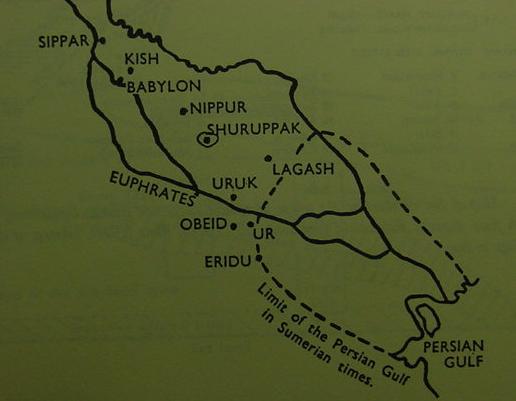
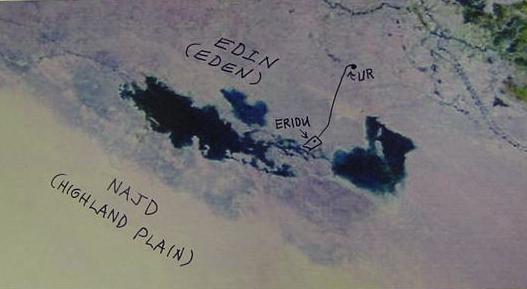
edin which means "uncultivated steppeland or plain"
man after being expelled from Eden eventually settles in a land of wanderers, called Nod and comes to live in a city called Enoch is a recast of Enkidu (Adam) and Shamhat (Eve) leaving edin to live at Sumerian Unug, Akkadian Uruk
Cain's (his Kain) city of Enoch with Uruk, which had been earlier called in Sumerian (his Accadian) Unug (his Unu-ki or Unuk) and the city of Eridu preserving the names of Irad and Jerad, other descendants of Cain:
"Its earliest name was the Accadian Unu-ki or Unuk, "the place of the settlement," of which the collateral form Uruk does not seem to have come in vogue before the Semitic period.
Garden is watered by a single stream that rises in Eden and that this stream later subdivides into four rivers, the Pishon, Gihon, Tigris (Hebrew Hidekkel) and Euphrates. The land of Nod ("land of wanderers"?) lies _east of_ Eden.
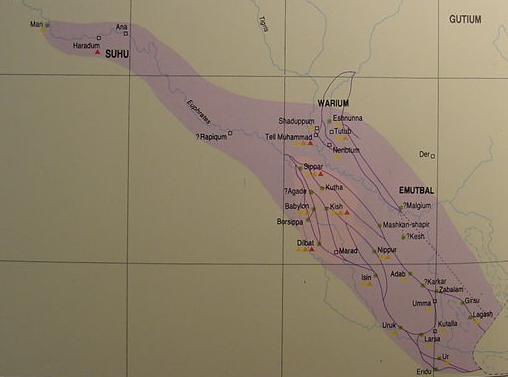
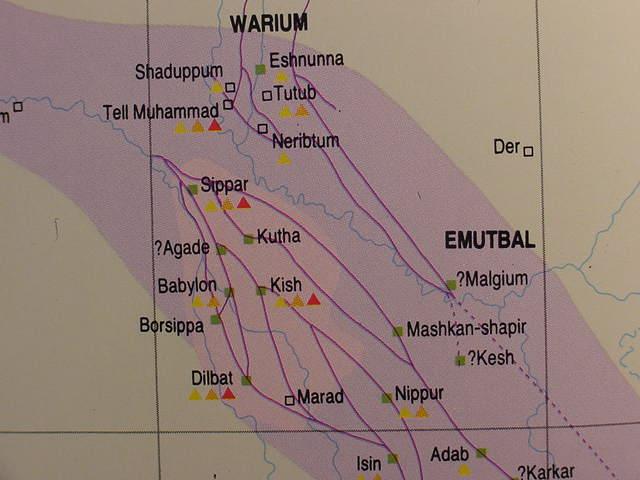
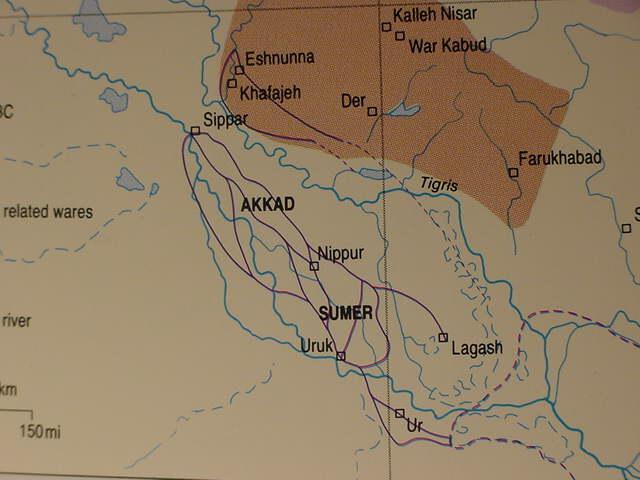
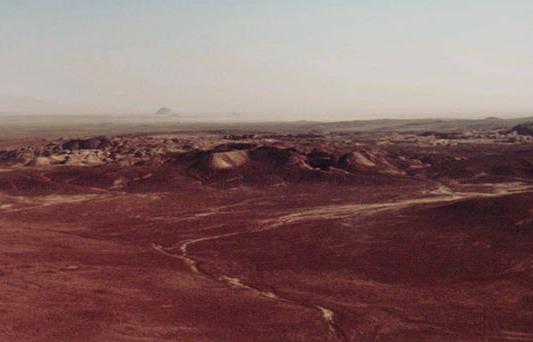
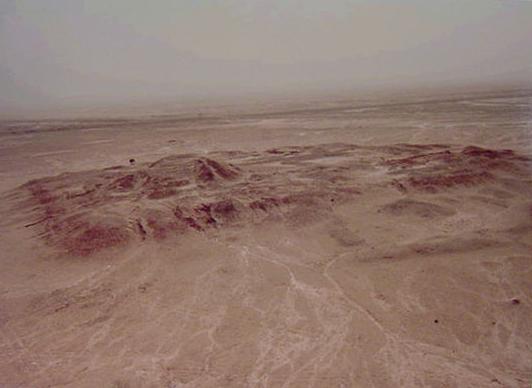
No comments:
Post a Comment